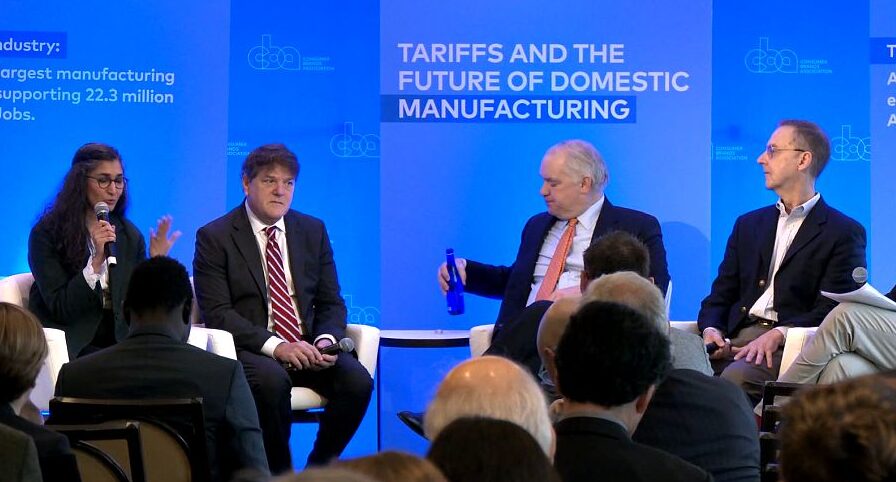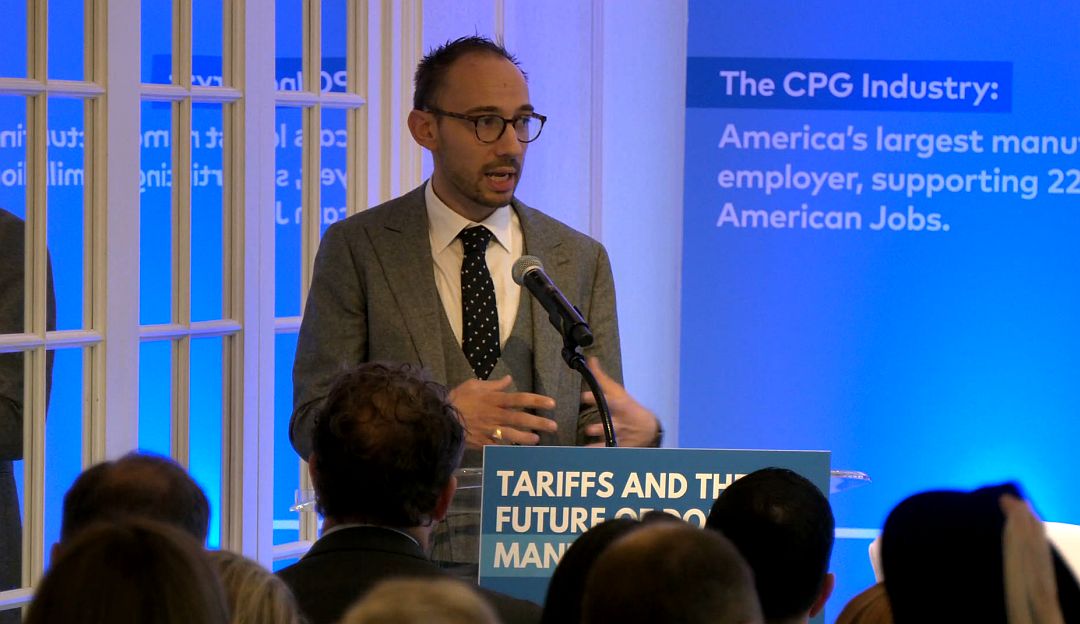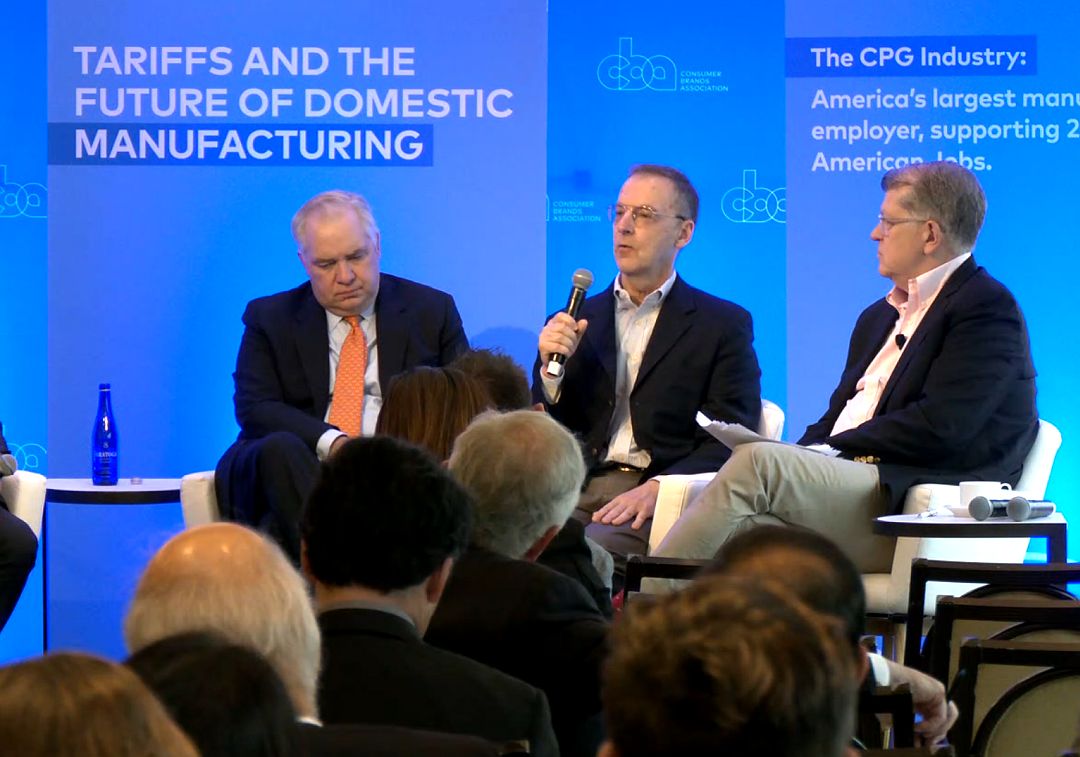Donald Trump “sees the US trade deficit as a sign that we’re losers in international trade,” economist Dr. Joseph Gagnon told delegates at an event exploring the potential impact of tariffs in Washington on Wednesday. “However he has a misconception, which is that tariffs reduce trade deficits. Well they don’t.”
Gagnon, senior fellow at Washington-based think tank the Peterson Institute for International Economics, was speaking at a summit hosted by the Consumer Brands Association (CBA) featuring an array of speakers from former United States Trade Representative Carla Hills to Jovita Neliupšienė, EU Ambassador to the US.
“In economic models that the Federal Reserve uses to study this, and that we’ve used at Peterson, tariffs have zero impact on the trade deficit,” claimed Gagnon.
“Why is that? If you put a tariff on China, say, the bilateral balance will go down with China, but it will go up with other countries. Likewise, if you put a tariff on one good, say steel, the steel deficit will go down, but the deficit for other goods will go up [for example as US companies paying more for steel become less competitive].”
And instituting across-the-board tariffs to address this whack-a-mole challenge “still doesn’t work,” claimed Gagnon. “Suppose you put a 10% tariff on everything entering the US? The dollar goes up 5% so that means that the cost of all those imports just went down by half of the tariff.
“The tariff has been cut in half, and our exporters get hurt because their costs have gone up 5% relative to their competitors. You lose as many exports as you gain. The dollar is strong now and getting stronger because the market sees tariffs [ahead].”
While it makes sense to use tariffs selectively “if there’s a real national security reason,” he observed, “For every winner in all these tariff policies, there’s always a loser. We must acknowledge that for every industry we protect, farmers are going to be hurt. Boeing is going to be hurt. Export is going to be hurt.”

‘We focus on trade because it’s an easy punching bag’
Inu Manak, fellow for trade policy at the Council on Foreign Relations, predicted “there will be carnage” should the Trump administration follow through on its campaign promises to institute blanket tariffs on goods coming into the US.
“If you look at the tariffs Trump originally put in place, they didn’t achieve any of his objectives. We did not change China’s behavior. We did not increase US manufacturing. Meanwhile, all the costs were passed through to consumers. So if you’re thinking whether this is a fantastic policy, the numbers speak for themselves.”
She added: “I think part of the motivation for a lot of this shift is a perception of US decline vis-s-vis China. But if you look at the figures, US manufacturing is actually doing pretty well. High productivity and lower employment is… just a fact of modern economics.
“So some of the things we have to think about are, what do we value and where we want to invest? And I think some of that comes down to where we invest in our workers and our workforce development, which we have not done. That’s the piece of the puzzle that’s not trade-related. But we focus on trade because it’s an easy punching bag.
In a fireside chat later that morning, Ambassador Carla Hills, former United States Trade Representative, added: “People said that we lost jobs because of trade. Wrong. We lost jobs because we had different jobs, and we did a poor job of training those that lost those jobs for the jobs that were for today and tomorrow, and we still need to do that.”
“We need to have balance in the way that we think about the entire American economy and the harm that we’re going to do to everyone just to protect very few people.” Inu Manak, Council on Foreign Relations
Tariffs can work well as a ‘tool, as a threat, to get other things done’
Other speakers at the event presented a more positive view on tariffs, or at least the threat of tariffs, with Everett Eissenstat, partner at law firm Squire Patton Boggs, noting that he is feeling “somewhat optimistic.”
America, he said, “has a very strong economy, a very big economy, and a big market. People want to access it, and I think tariffs can be used both to incentivize but also to coerce action. My experience is, whenever you have conflict, it always ends up in a negotiation.”
While he is concerned about the potential impact of tariffs on members, Francis Creighton, president and CEO, Wine & Spirits Wholesalers of America, added: “Last time he [Trump] used tariffs really, as a tool, as a threat, to get other things done.
“So when we talk to the Scotch Whiskey Association, for example, what we’re telling them is the tariffs against you specifically are part of a larger conversation with your government. Can you tell your government to get to the table and work out a deal with the United States and hopefully avoid this? And I think that that’s where you get to something smart.”
“To slap a tariff on our top two trading partners Canada and Mexico would create no benefit for us. We would lose jobs, we would lose revenue, we would lose GDP, and millions of jobs are connected to our trade with both of them.” Ambassador Carla Hills, former United States Trade Representative

‘Communities across the country have felt negative impacts of global trade’
A closer look at tools in the trade relations toolbox is very welcome, said Tom Madrecki, VP, supply chain resiliency, at the CBA.
“And we have communities across the country that, throughout the course of the last three decades, have felt negative impacts of global trade. So there’s a mature conversation that’s needed about how to restore American primacy, if you will.
“But for those manufacturers that already make things in America that inherently depend on global supply chains [he cited products from coffee to cinnamon that are not produced domestically], those views need to be balanced against other issues the incoming administration cares about, chiefly addressing grocery inflation and lowering the cost of cost of living.
“If you impose a tariff here, you may be increasing the cost of basic necessities that consumers rely on every day, which may lead to retaliatory tariffs on American agriculture. There’s no scenario where imposing a tariff on a product that isn’t grown or manufactured here doesn’t end up just increasing the cost of making that product. That’s just basic math.”
“Scotch is Scotch,” added Creighton. “If you’re a Scotch drinker, you’re not going to replace your Scotch with bourbon. If you want a perfect Bordeaux wine, that’s not a perfect California cabernet.”
Further reading:
CPG manufacturing platform Keychain sees uptick in activity as firms prepare for tariffs
‘There’s anxiety, but not panic…’ How supply chain and procurement teams are preparing for tariffs
How would Trump’s tariffs impact large food & beverage firms? And what about USCMA?





